 Prolonged dry conditions can cause problems; one of these is blue-green algae, which can overgrow in a stagnant pond. Aerating a pond can prevent blue-green algae, but if this is not possible the pond should be fenced off from livestock and avoided by humans and companion animals.
Prolonged dry conditions can cause problems; one of these is blue-green algae, which can overgrow in a stagnant pond. Aerating a pond can prevent blue-green algae, but if this is not possible the pond should be fenced off from livestock and avoided by humans and companion animals.
Examining a water sample under a microscope can only do confirmation of blue-green algae. However, you may note an earthy or musty smell, see surface scums of green, yellow or blue-green and the water may contain blue-green algae.
These tips will help keep your family safe from blue-green algae:
• Never swim in a lake during a blue-green algal bloom.
• Keep pets out of blue-green algae.
• Never drink or cook with lake water (green or not) because pathogens and contaminants may be present and boiling will not remove them.
If you have home and garden questions, please contact a UConn Extension office or call our Home and Garden Education Center at 877-486-6271.
Sources:
EDEN – Extension Disaster Education Network